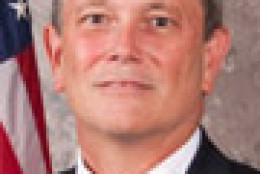Cybersecurity
-
The Office of Personnel Management offers new clues about the current and former federal employees affected by one data breach, while staying mum on the scope of another breach, thought to be much larger.
June 19, 2015 -
The important role an inspector general plays in identifying cybersecurity vulnerabilities was certainly highlighted with the OPM cyber breach. But IG vacancies still dot the federal government — some of which have persisted for years. Michael Smallberg is an investigator for the Project on Government Oversight, a group that has been tracking the IG issue in detail. He joined the Federal Drive with Tom Temin to discuss some of the issues surrounding the absence of Inspectors General at federal agencies.
June 19, 2015 -
The Office of Management and Budget wants to create a cyber playbook, and a digital services teams focused on IT security. Tony Scott, the federal CIO, said industry also must play a bigger role by automatically enabling two-factor authentication and using more secure chips.
June 19, 2015 -
As saying goes, ever dark cloud has a silver lining. That\'s true for the recent OPM cyber breach. You just have to look very, very, very hard to find it, says Senior Correspondent Mike Causey.
June 19, 2015 -
Federal News Radio asked readers how they rated the performance of the Office of Personnel Management in communicating information about the recent data breaches. An overwhelming number rated the information as \"poor\" and many still didn\'t understand what happened or what they should do next.
June 18, 2015 -
The letters sent to those affected by the Office of Personnel Management cyber breach contain a certain sentence that attempts to indemnify the government from any liability surrounding the breach. But that sentence alone may not protect the government from someone who wants to sue it for damages. Federal employment attorney Heidi Burakiewicz, a partner at the law firm Mehri and Skalet, joined Tom Temin on the Federal Drive with an insider\'s look at how the 1974 Privacy Act could cover recent cyber attacks and let lawsuits fly.
June 18, 2015 -
While the number of people in Congress calling for the OPM director to resign grows, the White House is voicing support for Katherine Archuleta. NTEU and NARFE have sent letters to OPM asking for more details on the second breach.
June 18, 2015 -
The DoD CIO wants to focus on the \"basics\" to shore up Pentagon\'s cybersecurity posture, including increased accountability for users of military networks.
June 18, 2015 -
The second term is when a President has traditionally concentrated on establishing his legacy. According to Senior Correspondent Mike Causey, it\'s also the time when things tend to get tougher -- and less friendly -- for the White House resident.
June 18, 2015 -
Commentary: Federal Drive host Tom Temin says he sees no other choice than for OPM Director Katherine Archuleta to resign over the agency\'s massive data breaches.
June 17, 2015 -
Office of Personnel Management officials told House Oversight and Government Reform Committee lawmakers that they didn\'t encrypt employee Social Security numbers because its systems couldn\'t handle the new technologies. Lawmakers pointed to previous breaches of contractors as a highly-probable way hackers got into OPM\'s system this time around.
June 17, 2015 -
As the Office of Personnel Management begins notifying feds of a second cyber breach, Senior Correspondent Mike Causey warns that more bad news may be on the horizon.
June 17, 2015 -
Adm. Paul F. Zukunft, Commandant of the Coast Guard, released a new cyber strategy for his command. He says that the weakest link an agency faces in protecting its IT systems is poor cyber hygiene by employees.
June 16, 2015 -
The Office of Management and Budget tells agencies they have 30 days to secure their networks. It appears to be reacting to the second major cyber breach at the Office of Personnel Management. That second breach puts military and intelligence security clearance holders at risk. You can read the details about the second breach at Federal News Radio dot com. Dave McClure is chief strategist at the Veris Group, and former associate administrator at the Office of Citizen Services and Innovative Technologies at the General Services Administration. He\'s writing about a few ground rules your agency should think about for better cybersecurity. He tells In Depth with Francis Rose about the \"cut and paste\" approach to collecting threat information and what that means for agencies.
June 16, 2015 -
Commentary: Embarrassment agency suffered from undetected hacks multiplies with its botched response.
June 15, 2015





